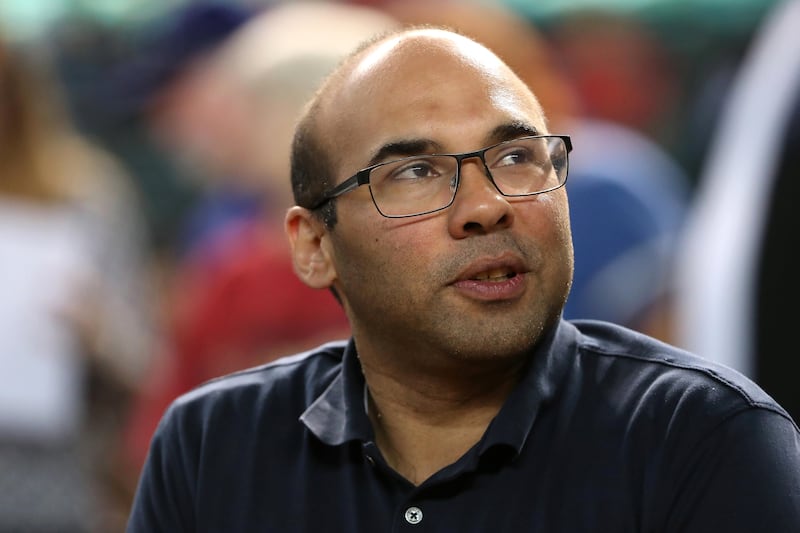The Los Angeles Dodgers are a big team, in a big city, with a big chequebook to buy the best baseball players.
So in 2014 when they swooped for Farhan Zaidi, known for recruiting bargain basement pitchers and hitters at the thrifty Oakland Athletics, as their general manager – the first Muslim to occupy the position in any professional sport in America – not all their fans were impressed.
Worse followed as he quickly traded away some of their biggest names to make way for new arrivals.
This month his plan fell into place. The Dodgers ran away with the National League and are playing for their first World Series since 1988.
The seven-game series is tied 1-1 after two games this week and Zaidi admitted the big bank balance was part of their success.
"But you want to win and compete in every player market," he told The New York Times as he stood in the clubhouse afterwards, "not just the high-end market, but the market for players who may have been passed over in other organisations, the market for minor league free agents who have a chance to impact you at the major league level."
Which goes some way to explaining how a man born in Canada to Pakistani parents, raised in the Philippines, and who never played the sport beyond high school, came to be one of the most wanted brains in baseball.
_______________
Read more:
World Series: Springer springs to life as homer helps Astros secure Game 2
World Series: Some like it hot as Justin Turner roasts Houston Astros
_______________
Rather than sporting prowess, it was the programming techniques he learned at the Massachusetts Institute of Technical and the critical thinking he developed researching a PhD in behavioural economics at the University of California-Berkelely that made him a hot property, able to spot the sort of talent others missed.
That journey began when Zaidi’s father Sadiq, a British-educated engineer, took a job with a mining company in Ontario, Canada, in 1968.
Zaidi was born in the town of Sudbury but it was not long before he was on the move, at the age of three, to Manila where his father worked for the Asian Development Bank.
He absorbed the culture of American and Canadian friends at his international school, playing first base and developing a passion for collecting baseball cards. His father’s efforts to teach him cricket foundered when the young Zaidi realised his baseball grip was never going to translate to the other sport.
Instead he pored over the writing of Bill James, one of the early pioneers of sabermetrics, writing off for one of his famous “abstracts” before the age of 10.
His studies played second fiddle.
Yet still he left school at the top of his class – much to the amazement of his parents who fretted at his relaxed attitude.
At the age of 17 he left home to begin his studies at MIT before moving on to Berkeley, where for all his focus on economics, baseball was never far away. In one paper, he even managed to use baseball card collectors as a paradigm for understanding irrationality in behavioural economics.
Any kind of career in the sport itself seemed improbable.
"It always seemed to me that to work in a baseball front office, you had to have played the game at a high level, or been a scout or a coach," he told The National in a 2014 interview. "It didn't seem like a career you could access from a business background.
"When I read Moneyball, I thought, 'I do have this skill set.'"
The book by Michael Lewis tells the story of how Billy Beane used sabermetrics – the collection of huge amounts of in-game data - to turn the underachieving Oakland Athletics into contenders. Brad Pitt starred in the 2011 film of the same name.
When a job came up at the Athletics, he sent in an application and then prepared for 18 hours a day making performance projections for the entire roster.
Beane was impressed. It turned out he also shared a love of the British rock band Oasis and offered the young PhD candidate his first job in baseball, much to the chagrin of Zaidi’s supervisor at Berkeley who believed he could become a superstar in the field of economics.
He quickly made an impact in the stats obsessed franchise by using Stata, one of the computer programmes he had learned as an undergraduate. It allowed him to evaluate new players and trade prospects as raw numbers, as if they were equity assets.
"There are good trades, bad trades; there will be times when you come out on the wrong end, but if you have the right process, you're going to be right more times than you're wrong," he later told an MIT magazine.
His obvious success meant rivals soon came calling. Not, as Beane once joked, in the form of Google or Apple but in the shape of the Dodgers.
That job as general manager puts him at the pinnacle of the sport, responsible for appointing coaches, managing the scouting operation and masterminding player trades at one of world’s most iconic sports brands.
It makes him one of a growing number of nerds to now occupy the highest rungs of a game.
But he has done it as a Muslim and as the son of Pakistani parents, a heritage that marks him out as unusual in the major leagues of any sport in North America.
“I’m a big proponent of diversity in our game,” he said when the Dodgers unveiled him at a press conference in 2014. “So from that standpoint, I’m proud of it.”






